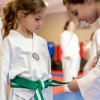
Grand Master Weatherly started Martial Arts training in 1961 in Korean Yudo (Judo). After 1 year Great Grand Master Jae Sun Ji began teaching Hapkido Sun Moo Kwan in the same building. Master Weatherly became his first American student. Back in those days classes were held 7 days per week. If you did not attend every available class, you were generally considered a poor student ("Pa Ja")!
A PaJa, because of his lazy attitude, was never taught any of the advanced techniques, and was only shown simple, basic skills. Classes were very physically, intellectually and spiritually demanding.
A PaJa, because of his lazy attitude, was never taught any of the advanced techniques, and was only shown simple, basic skills. Classes were very physically, intellectually and spiritually demanding.
Services
I've about had it! My 15 year old son is being bothered almost every day at school. This just continues to escalate; Friday he was actually slammed into a locker! We are desperate; we don't glorify fighting or violence, but enough is enough. What type of Martial Arts would you recommend? Heather, unfortunately this is a problem many families face.
In dojangs throughout the world, voices echo "pil sung" every day. Literally, a battle cry without borders, pil sung united Korean stylists in a common bond of martial spirit; The Korean phrase "pil sung" means certain victory. But, one naturally asks, "Victory over what, over whom?" Does the victory envisioned in pil sung refer to victor over vanquished, conqueror over the defeated?
The World Martial Arts Academy first opened its doors in 1945 in Kwangju Province, South Korea. The Founder of the Academy, Great Grand Master Jae Sun Ji (9th Dan) came to the USA in 1961 and opened the first Dojang (training center) outside of Korea. Located in Flint, Michigan, the school was known internationally for its outstanding results and dynamic, innovative teaching methods.
Traditional Martial Arts can benefit men, women, and children from age 3 and up. Through diligent practice, the training will help you develop strength, quickness, balance, timing, flexibility, and coordination. At the same time your powers of concentration, self-discipline, and self confidence will significantly improve.
Tae Kwon Do is the name of the Korean Martial Art many people think of as Karate (Japanese word for "empty hand"). However, it is much more than simply an "empty hand" and many Orientals actually translate Tae Kwon Do to mean "Super Karate" so students will know the difference. With over 20 million registered Black Belts, Tae Kwon Do is easily the most popular Martial Art in the world.



